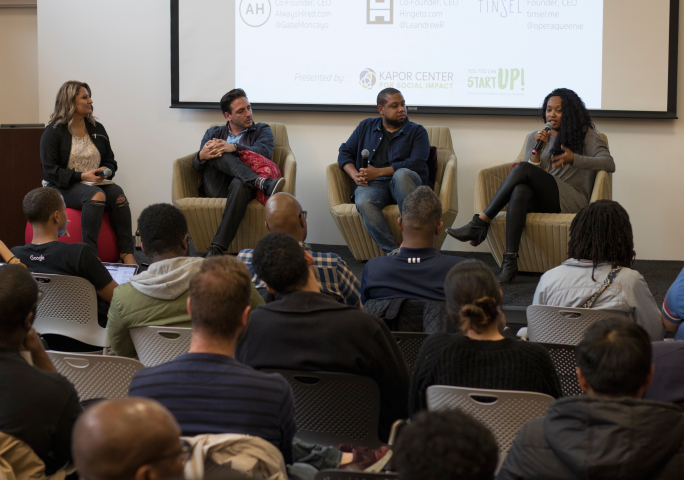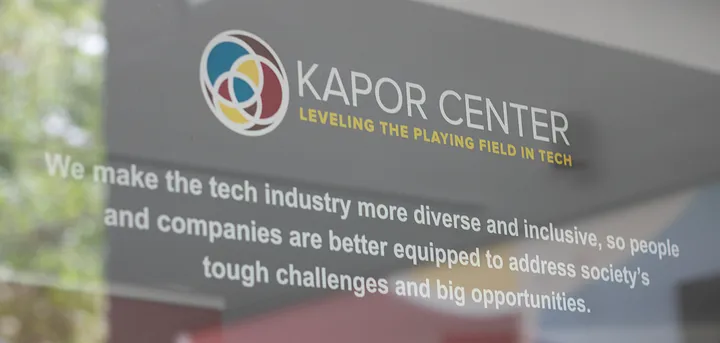Earlier this month, angel investor Jason Calacanis announced a new initiative to fund an alternative to Facebook — a brand new social network that would connect the world while protecting the privacy of its users. His Open Book Challenge will invest $100,000 in each of seven founding teams who can build the platform that will topple the world’s largest social media network.
This is a hugely important idea, and with real financial backing it could become a reality. That excites us.

Our first concern was that — as is usually the case with big investment opportunities — underrepresented entrepreneurs would face barriers to participation. So we asked Jason if he’d be willing to host a forum at our Oakland headquarters where we could present the opportunity to our network, answer questions and ensure that black, brown, women and LGBT founders had access to the challenge.
Jason’s response was swift and definitive. “Love it!” he wrote back, and quickly sent some dates. So on Friday, June 1st, Jason will be joining us in the Lotus Auditorium at the Kapor Center.
Jason, we know, is a complicated and polarizing figure. He’s made a number of statements over the years that have spurred outrage, from denying the pernicious role of racism in tech to arguing against the concept of privilege. He has been accused of sexism and Islamophobia — charges he strenuously denies.
Each of these accusations calls to mind a side of tech that we frequently denounce and, indeed, have spent our careers working to stamp out.

Our own history with Jason has been more nuanced. Notably, when we called out Uber’s leadership for the company’s toxic culture, other VCs and LPs, the ones who sign diversity pledges and are seen as ‘enlightened’, engaged in backstabbing and trying to undermine our credibility with some of our entrepreneurs. Jason was the only venture capitalist willing to go on the record with NPR reporter Aarti Shahani publicly criticizing us.
He was s also one of the few VCs to visit our SMASH Academy over the past 15 years, spending the day with our underrepresented STEM scholars and taking the time to understand the barriers they face. He tweeted about the program.
Freada and others challenged him publicly on a panel at his Launch conference in 2013 . His response was thoughtful, respectful and appreciative (check the 32:00 mark on the clip of the exchange, below). We can work with that.
https://cdn.embedly.com/widgets/media.html?src=https%3A%2F%2Fwww.youtube.com%2Fembed%2FpoYruIi7m3M%3Ffeature%3Doembed&url=http%3A%2F%2Fwww.youtube.com%2Fwatch%3Fv%3DpoYruIi7m3M&image=https%3A%2F%2Fi.ytimg.com%2Fvi%2FpoYruIi7m3M%2Fhqdefault.jpg&key=a19fcc184b9711e1b4764040d3dc5c07&type=text%2Fhtml&schema=youtube
So we know what we’re getting into when we invite Jason to our stage next week, and so does he — there will be some tough questions. More importantly, we know that this opportunity to build a real viable alternative to Facebook, to include underrepresented founders in the process, is far too big and far too important to pass up.
We expect that we’ll get some criticism for working with Jason — we’ve already fielded some on Twitter — and that’s fine. As Freada noted in the Launch panel clip:
I think we want an environment where we can challenge each other. Where we can say “wait a second, I assume your heart is in the right place, but you just stuck your foot in your mouth…and let’s talk about why what you did or said is exclusionary.”
That’s the spirit we enter this in.
Social media has done a tremendous good by giving people a platform to speak their truth, and we’re only beginning to see just how many of these movements, from #BlackLivesMatter to #MeToo and others, will fundamentally shift our culture for the better. The flip side of this social good is a call-out culture that lumps people into immutable categories of irredeemably good or bad. We resist this online purism because we know people are complicated. People grow. The world is abounding with nuance.
Most importantly, the Open Book Challenge presents an unprecedented opportunity to do a public good. Imagine if Facebook had had enough diversity on its team to spot the obvious race divisions that Russian advertisers or bots were seeking to foment — the history of our last two years might have had a very different outcome.
So we’re looking forward to bringing Jason to our stage next Friday, and we’re especially looking forward to bringing the Open Book Challenge to our diverse network of entrepreneurs and geniuses.

